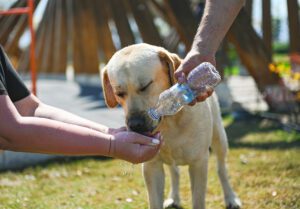Signs of Dehydration in Dogs
As responsible and loving pet parents, understanding and recognizing the signs of dehydration in dogs is a critical skill. Especially here in Columbus, Ohio, where we experience a variety of seasonal weather changes, your dog’s hydration status can mean the difference between a playful, energetic pet and a life-threatening situation.

What is Dehydration in Dogs and Why is it Dangerous?
Dehydration occurs when your dog loses more fluids than they’re taking in, resulting in an imbalance that affects normal bodily functions. It can occur due to excessive physical activity, illness, or lack of access to water. In severe cases, dehydration can lead to organ failure and can be fatal.
Importance of Hydration for Your Dog’s Health
Water makes up a significant percentage of your dog’s body and is essential for many functions such as digestion, nutrient absorption, and temperature regulation. If your dog becomes dehydrated, it may struggle to perform these vital functions, putting its health at risk.
Top Signs of Dehydration in Dogs You Should Never Ignore
As Columbus dog owners, what signs should you look for to identify dehydration in your furry friends?
Check the Gums for Signs of Dehydration
One of the quickest ways to check your dog for dehydration is by examining its gums. Dehydrated dogs often have dry, sticky gums instead of the usual moist feel.
Unusual Behavior and Fatigue
A dehydrated dog may seem unusually tired, lethargic, or may move more slowly than usual. They might also lose their appetite, which can exacerbate the dehydration.
Skin Elasticity and Dehydration
A simple ‘skin tent’ test can indicate your dog’s hydration status. Gently pull up the skin at the back of your dog’s neck or between the shoulder blades. If it snaps back quickly, your dog is likely well-hydrated. If it slowly returns to place, your dog might be dehydrated.
What to Do if You Suspect Dehydration in Your Dog
If you’ve spotted these signs and suspect your dog is dehydrated, it’s important to act quickly.
First Aid Measures for Dehydrated Dogs
Offer your dog cool, fresh water and encourage them to drink. However, be careful not to let them drink too quickly, as this can induce vomiting, leading to further dehydration.
When to Contact North Kenny Veterinary Hospital
If your dog’s symptoms continue, it’s time to call the experts at North Kenny Veterinary Hospital or visit our website https://northkennyvet.com/ to make an appointment.
Preventing Dehydration in Dogs
Prevention is always better than a cure. Here’s how you can prevent dehydration in dogs.
Provide Ample Fresh Water
Ensure your dog always has access to fresh water. Check their water bowl several times a day and refill it as needed.
Be Mindful of the Weather
During hot Columbus summers, ensure your dog has shade and water if they’re outside. In winter, ensure water dishes aren’t frozen over.
Remember, the North Kenny Veterinary Hospital team is here for all your pet’s needs. Recognizing the signs of dehydration in dogs can save your pet’s life. Let’s keep our canine companions healthy, Columbus!
Recent Posts
About North Kenny Veterinary Hospital
North Kenny Veterinary Hospital has been serving Columbus, OH pet families with exceptional veterinary medicine since the 1950s. We put a strong emphasis on preventive medicine as well as low-stress handling to help pets have a more pleasant veterinary experience. We use Fear Free techniques for every cat and dog to help reduce their anxiety and calm their nerves.
